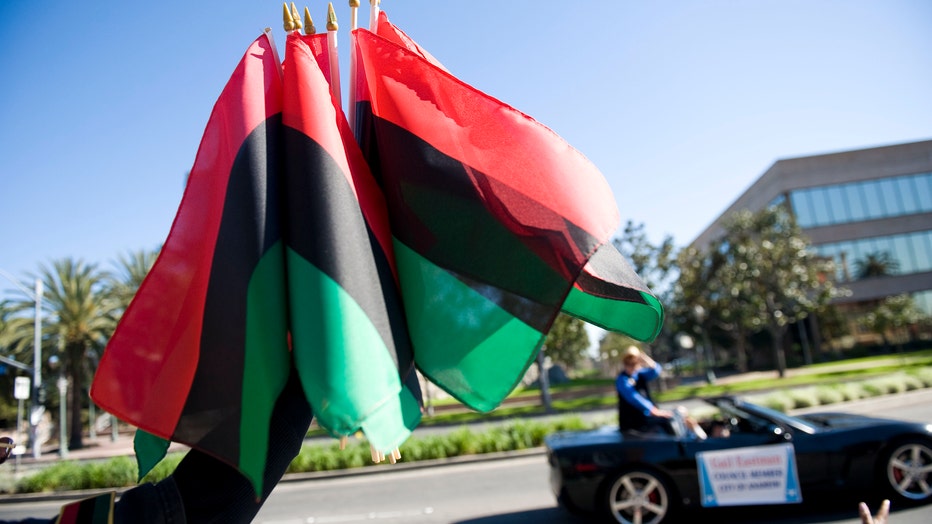Celebrating Black History Month: Exploring the origins of 'Afro-Arab'
Exploring the origins of 'Afro-Arab'
You've heard the term "African American." Many understand that to mean an American of African descent, but are you familiar with someone who identifies as Afro-Arab?
There is not one blanket image of the Black experience. That's what FOX 5 aims to show through a series of Black History Month stories.
You've heard the term "African American." Many understand that to mean an American of African descent, but are you familiar with someone who identifies as Afro-Arab?
Millions of years ago, the land mass that is commonly described as today's "Middle East" was connected to modern-day Africa.
If you look at a map, it's like a puzzle piece that fits right into place.
"Africans used to trade with gold from Ghana and also salt to Europe," Clark Atlanta Public Administration Chair Professor Henry Elonge said. He explained there was trading to the east as well. "Even the Arabs did not leave the way they came in. "There was intermarriage."
You can view this ethnic mixing as a cultural melting pot.
Jamila Kizonda has lived in Atlanta for just under three years. She's from Kenya, speaks Swahili, is Muslim and embraces all of her intersecting identities--not African or Arabic, but both.
"Division that has been said of 'Africa only begins from the south of the Sahara.' Where is we claim from Egypt ... Eretria this is all one continent which has for years been intermingling and marriage to produce the afro Arabs You need to be proud of who you are," she said. "It's a good blend."
"It starts from you, that pinch in you to know of your roots and the love of where you come from," Kizonda said.
Now Kizonda shares all parts of her identity through her catering business, "Swahili bites."
"I felt like of all the other cuisines, Swahili has never been given a chance to be understood what it is, what it was made of," she said.
PODCAST CAPTURES CONVERSATIONS USUALLY RESERVED FOR BLACK BARBERSHOPS, HAIR SALONS
Each customer walks away with a better understanding of her specific Black world view.
"My intent is not just food-- it is history, culture and language," she said.
Just as someone who grew up in New York City may see the world differently than someone who grew up in Montana, the Afro-Arab experience in America differs too.
"I didn't imagine I'd be classified as Afro-Arab," Zuhair Hawsawi said. "When I came here nobody recognized whether I'm an American or not until I speak. When I speak they immediately ask where I'm from."
Hawsawi and his immediate family were all born and raised in Saudi Arabia.
"Our great-great-grandparents came to Saudi to perform Hajj," he explained.
Hajj is a Muslim pilgrimage to Mecca. All in the faith are expected to make the trip at least once in their lifetime. Zuhair is not sure which African country his family migrated from hundreds of years ago, but they made it to Mecca and never left.
He's now working on his PhD at The Historically Black University Clark Atlanta, while getting to know Black students in the US.

ANAHEIM, CA - FEBRUARY 01: Beatrice Jones, selling black history flags, waves to Anaheim City Council member Gail Eastman during the 34th annual Orange County Black History Parade along Anaheim Boulevard Saturday morning. ///ADDITIONAL INFO: blackhis
MORE BLACK HISTORY MONTH STORIES
"It's comfortable. I like the way they're really enthusiastic to feel like they belong somewhere, their roots belong to a specific country in Africa," he said. "They are trying so hard to find out where they're originally from."
He says Saudi Arabia is a colorful country, with people of varying skin tones, but those physical differences aren't discussed the same way they are here in the US.
"When I listen to podcast or radio or watch news they have them identify whether a person is black or white," Hawsawi said.
"In Saudi, just calling a Black person or someone who is not white by the color it's something forbidden based on our religion," he explained.
"Clark Atlanta has as one of its major goals to correct some of the mistakes that happened in slavery-- one of which is slavery the other the lies or misinformation to divide the African continent between the north and south basically based on color," Professor Elonge said.
"Egypt, Morocco, Algeria, because they experienced and Arabic conquest, so they have lighter skinned Arabian peoples, it is not considered as Africa by many people. When they say that about Africa, they mean south of the Sahara," he said.
"Our university, Clark, wants to begin to correct that mistake, meaning they want to bring people from other Arab countries to come here, so ideas should continue. When we get into the class setting, the students begin to learn and appreciate," he said.
A variety of Arab experiences, all equally valid here in Atlanta, all puzzle piecing together to contribute to the city's rich Black History.
____
WATCH: FOX 5 NEWS LIVE COVERAGE

